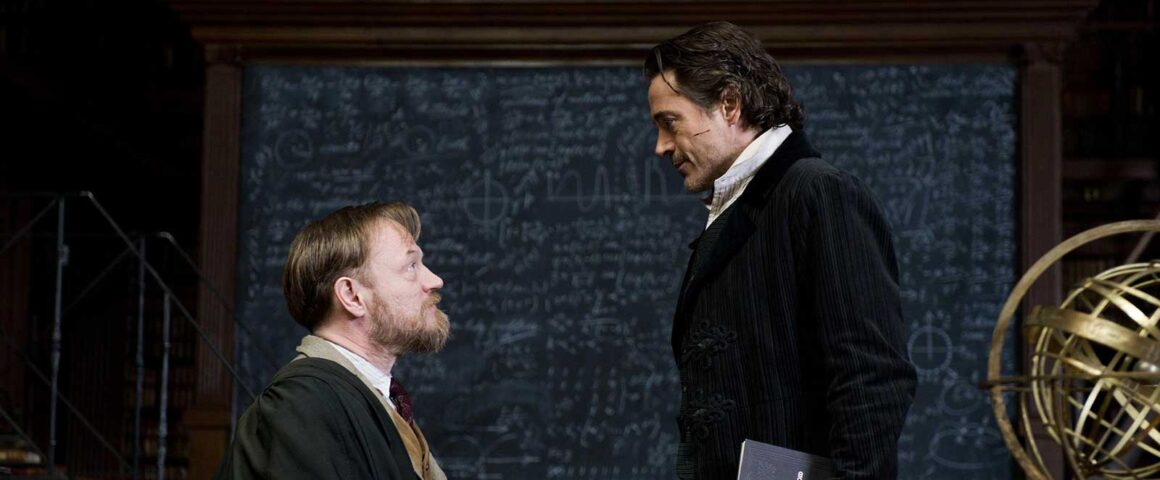Even though there are now two films in Guy Ritchie’s vision of the Sherlock Holmes universe (the first aptly titled “Sherlock Holmes“), I am still getting accustomed to the athletic, street fighting Holmes as opposed to the merely cerebral genius who used to chase suspects by horse and buggy rather than bash their brains out in back alleys. In Sherlock Holmes: A Game of Shadows, the villain is more formidable, the action consumes more screen time, and the jokes are more cringe inducing. And to top it off, Sherlock (Robert Downey Jr.) has noticeably upped his drug habit with side references to cocaine and routinely drinks embalming fluid rather than boring old brandy.
Why the sudden surge for uppers? First, Sherlock is matching wits with Professor Moriarty (Jared Harris). Moriarty appears to match Holmes man to man intellectually; however, he has follows no moral code or displays any hint of empathy whatsoever. This makes his the most dangerous man in Europe. I will not divulge any plot points concerning his evil deeds because that is half the fun of a Sherlock story, following the trail as he discovers clues which lead him to the next location. Second, Dr. Watson (Jude Law) insists on going through with his marriage, a prospect Sherlock frequently reminds him will destroy his manhood and shatter his well-being.
Sherlock’s interactions with these two characters, Moriarty and Watson, define the high and low ends of Sherlock Holmes: A Game of Shadows. When Sherlock and Moriarty share the same room, real tension emanates from the screen. Their verbal sword play is a credit to the writing and the actors who joust for tactical advantage just by using metaphors. Two scenes between these men jump to mind. Early on, Sherlock analyzes Moriarty’s handwriting while Moriarty warns Sherlock of the dangerous path he is following. I will not describe a later scene between the two gentlemen, but it is the most effective in the film as they mentally assail one another.
The low and tedious end is Sherlock’s interactions with Watson. The relentless double entendres about their “relationship” leads the audience to question whether or not Sherlock is homosexual. For a wisecrack or two, this would provide levity and amusement. Unfortunately, the script persistently wails against this dead horse of a joke. A homoerotic double meaning pops up about every 30 seconds when Sherlock and Watson share the screen. It soon grows dreary and began to test my patience, especially during an extended sequence with Sherlock in drag.
Awful dialogue between Sherlock and Watson aside, Guy Ritchie’s cinematography style — inventive and momentum shifting action scenes — is also a detriment. Sometimes bullets fly faster than the speed of light and then shift to “Matrix” time so the audience can watch it pierce someone’s clothing or splinter a tree into firewood. Shifting between fast and slow motion in action sequences is also helpful to determine the placement of good and bad guys, but after a prolonged amount of time, these shifts become significantly noticeable when instead they should be only slightly perceptible. When the third or fourth action sequences rolled around, not only were Ritchie’s trademark shifts noticeable, they were all consuming, taking me — and much of the audience — out of the scene and into the mechanics of the production.
What always ends up bringing the script back on track, is what Sherlock is known for — his fascinating method of deductive reasoning. Before he makes a move, the script may flash forward as he meticulously plans his next position in a street brawl or it may flash a few minutes back in time to show the audience just how he set up the bad guys to fail. Sherlock is always one step behind Moriarty who regularly seems to be the smarter of the two; however, if you are the individual planning and executing the scheme, those following you will always appear to be lagging behind.
And because of this, Sherlock Holmes: A Game of Shadows is still a recommendable sequel. The renowned detective is a bit more troubled (and flawed) and his villain is so much more sociopathic. It could have done without so much Watson though, as he has begun to draw eye rolls instead of applause as the sidekick.




'Movie Review: Sherlock Holmes: A Game of Shadows (2011)' has no comments